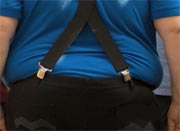
FRIDAY, Jan. 10, 2014 (HealthDay News) — Women are four times more likely than men to seek weight-loss surgery, a new study finds.
And men typically are older, more obese and sicker than women when they do see a doctor about having the procedure, the researchers found.
“It is important for men to realize that obesity poses a serious threat to their health and life spans,” senior study author Dr. Mohamed Ali, chief of bariatric surgery at the University of California, Davis, said in a university news release. “A patient who is 100 pounds or more above his ideal body weight poses a therapeutic dilemma and should be referred to a surgeon.”
Ali said that although weight-loss surgery can help obese men, surgeons must weigh the potential benefits against a patient’s risk for post-surgical complications.
“This risk would be significantly lessened if obese males were referred to [weight-loss] surgeons before they develop serious disease complications,” Ali said.
For the study, published in the December issue of the journal Surgical Endoscopy, researchers examined data from nearly 1,400 patients who were evaluated for weight-loss surgery at UC Davis between 2002 and 2006. Nearly 82 percent of the patients were women.
The male patients had more obesity-related health problems than women (an average of 4.5 versus 4.2) and more serious forms of these conditions. For example, men were more likely to have high blood pressure (69 percent versus 55 percent), diabetes (36 percent versus 29 percent) and obstructive sleep apnea (72 percent versus 46 percent). Metabolic syndrome, a combination of conditions that increases the risk of heart disease, also was more common among males (21 percent versus 15 percent).
Men also tended to have higher body-mass index (BMI), a measure of body fat based on height and weight. The men’s average BMI was nearly 49, while women’s BMI averaged less than 47. A BMI greater than 40 is considered severely obese.
Other differences: Male patients were about two years older than female patients and more likely to be over age 50.
At the time Ali conducted his analysis, 70 percent of the patients in the study had undergone weight-loss surgery, but only 14 percent of them were men.
More information
The U.S. National Institute of Diabetes and Digestive and Kidney Diseases has more about weight-loss surgery.
Copyright © 2026 HealthDay. All rights reserved.

